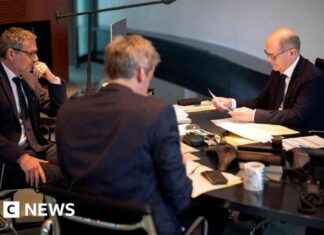WINNETKA, ILL.—When a largely white public school nestled in Chicago’s wealthiest suburbs planned a daylong civil rights seminar, it drafted two National Book Award winners as keynote speakers and crafted a syllabus that would be the envy of most liberal arts colleges.
But New Trier, a high-achieving, 4,000-student high school regularly ranked among the nation’s best, found itself stepping into the minefield of the national dialogue on race and civil rights. Some parents and conservative groups have deemed the event during Black History Month “radical” and “divisive.” Dueling petitions circulated, heated emails were exchanged and hundreds of people packed a school board meeting beyond capacity.
While New Trier’s demographics and resources aren’t reflective of many public schools, the debate highlights the complications of teaching civil rights when much of the country struggles to discuss race. Some educators worry their work will become more difficult after a polarizing election that’s fuelled divisions, even in homogenous and largely Democratic areas like the upscale Lake Michigan suburbs making up New Trier.
For educators the goal is simple.
“One of the things we most hope happens is for the kids to be able to see the world through someone else’s eyes,” said Superintendent Linda Yonke.
Dozens of workshops Tuesday will cover such topics as voter suppression, affordable housing and police brutality. Colson Whitehead, whose historical fiction “The Underground Railroad” has won literary accolades, will speak.
Organizers want students to think about how race might affect daily life and be moved to action, if necessary. Administrators and many parents say it’s particularly important because of the school’s population: Roughly 85 per cent of the students are white with similar demographics among the teachers. In Winnetka, home to the main campus, the median household income is more than $200,000 and stately brick mansions are common.
New Trier began all-school seminar days in the early 1990s, though it’s not an annual event. Students and teachers write the curriculum and regular attendance rules apply. Topics vary. In previous years, the school has addressed the Sept. 11, 2001, attacks.
The first hint of a pushback started last year, when the event coincided with Martin Luther King Jr. Day and one workshop included ways to explore white guilt.
As this year’s Seminar Day approached, opposition spread.
Breitbart News — once led by White House chief strategist Steve Bannon — deemed the event “a major left-wing indoctrination project.” The National Review weighed in, as did the Illinois Family Institute, calling it a “smorgasbord of ideologically non-diverse seminars.” A local publication backed by a conservative activist and businessman dug up school administrators’ voting records. A Wall Street Journal opinion piece proclaimed it a “racial indoctrination day.”
Parents, some linked to conservative organizations, formed a small but vocal opposition group.
“The school went about this in a way that ensures it will be narrow and divisive,” said Betsy Hart, who has two children enrolled. Hart, a senior writer at the conservative Heritage Foundation who says her school activism is separate from her day job, expects the parent group to continue pushing for more conservative voices at New Trier High.
Among its numerous and nuanced requests, the group wants to add research supporting voter identification laws to a session on voter suppression and ensure a panel on affirmative action includes contrasting views such as the suggestion that it’s detrimental for minorities. The group has presented the district with a three-ring binder full of research and an annotated schedule for the day: yellow highlights for language the parents find objectionable and green for suggested alternatives.
Still, most students and their parents have expressed support for the day. About 450 people signed a petition seeking different speakers versus roughly 5,000 signatures for keeping the lineup as is.
School administrators said parents had opportunities to air concerns, and adding last-minute speakers doesn’t boost the seminar’s quality.
“Critical thinking is about more than having two opposing views,” said Tim Hayes, an assistant superintendent.
He and others worry the opposition is in reaction to the nation’s political climate and not the educational content. Experts say most schools already struggle with teaching civil rights.
A 2012 study by the Southern Poverty Law Center examined curriculums in every state and concluded the majority failed to require teaching about the movement while others oversimplified it.
Isabelle Hauser, a 17-year-old junior, said she won’t attend the seminar. The biracial teen, whose father is white and mother’s family is from Ecuador, said she was turned off by last year’s talk about white guilt.
“It’s a matter of the day being balanced. I see it as being too progressive and liberal,” she said. “You shouldn’t feel guilty for attending such a great school and having a great education. You should feel blessed.”
Other students argue that’s the point. Some have prepared for Seminar Day by watching Spike Lee’s 1989 film, “Do The Right Thing,” which tells the story of simmering racial tension in a New York neighbourhood that erupts in violence.
“When the thing that your community is most worried about is that your education is too liberal, I feel like that’s a motivating factor to get out more,” said 17-year-old Celia Buckman, a senior at New Trier. She writes for the Huffington Post, including an article supporting the seminar. “It really makes you think about the kind of privilege that your community really has.”
The Toronto Star and thestar.com, each property of Toronto Star Newspapers Limited, One Yonge Street, 4th Floor, Toronto, ON, M5E 1E6. You can unsubscribe at any time. Please contact us or see our privacy policy for more information.
Our editors found this article on this site using Google and regenerated it for our readers.





